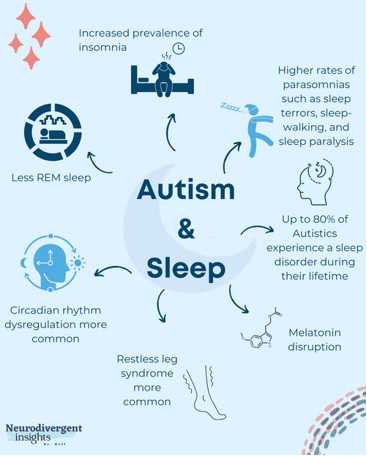7 Tips To Help Children With Autism Have A Restful Night Sleep
19th July 2024

Researchers estimate that between 40%-80% of children with autism spectrum disorder have trouble sleeping.
Children with autism spectrum disorder (ASD) frequently experience sleep issues, which have a substantial negative influence on many areas of their lives. These difficulties may have an impact on daily schedules, social relationships, and academic achievement. They may also make parents feel more stressed.
A few of the best methods for encouraging better sleep include behavioral interventions, altering the sleeping environment, educating people about sleep, and, in certain situations, giving professional-recommended supplements.
How Can You Help Your Child With Autism Sleep Better?
Creating a nighttime ritual or making little adjustments to the bedroom's lighting and temperature can go a long way toward addressing sleep troubles in children on the autistic spectrum. Maintaining regular waking and bedtimes also helps them manage their body's internal clock, which improves the predictability and dependability of their sleep.
Additionally, returning to a regular sleep pattern may help autistic youngsters learn more effectively, be less agitated, and exhibit comparatively less problematic behaviors.

Source: neurodivergentinsights.com
Here are a few simple and immediate steps to ensure autistic children get a good sleep:
- Comfortable Sleep Environment
Arrange a nice mattress, plush bedding, and a reasonable sleeping temperature in your room. Additionally, you can reduce light and noise disruptions to encourage deeper sleep. But keep in mind to take your child's sensory preferences and sensitivities into account while adjusting the sleep setting, and make sure it's sensory-friendly. Here, weighted blankets and smooth textures can contribute to a feeling of relaxation and comfort.
Do you follow us on Social Media? If not, then you’re missing out on a lot of informative content. We regularly share upgraded educational content, tips, feedback, and more. Check us out by clicking the profiles here – Facebook / Twitter / LinkedIn / Pinterest / Instagram / YouTube
- Consistent Bedtime Routine
As was previously said, a consistent bedtime routine may be quite helpful in enhancing your child's quality of sleep. Calming activities like reading or listening to soft music may be incorporated into the routine to assist your youngster in understanding when it's time to unwind, go to bed, and get some rest. Your kid may unwind and get ready for sleep by adding relaxing aspects to their pre-sleep routine, such as a warm bath or relaxing music.
- Limit Screen Time
Cut down on your screen time before bed since blue light from displays might disrupt your sleep. Furthermore, instituting a screen-free policy for your child at least an hour before bedtime would be quite beneficial. By establishing a relaxing bedtime routine, this technique can help people's minds relax and improve the quality of their sleep. Making nighttime a treasured part of your daily routine, it's also a moment for connecting through goodnight stories, peaceful activities, or calming chats.
- Physical Activity
Encourage your child to be active during the day so they can burn off energy and go to sleep more easily at night. On the other hand, stay away from intense activity just before bed since this might cause irregular sleep patterns. To create the conditions for a restful night's sleep, think about participating in enjoyable, low-impact activities like a soothing yoga class before bed or a leisurely evening stroll with your significant other.
- Diet Considerations
Pay attention to your child's food, particularly at night. A light, balanced meal should be served, and heavy or spicy items that can cause discomfort should be avoided. Limit coffee and sugary foods close to bedtime. This may be a fun family mealtime experience if you establish a calming evening routine that helps your youngster link food with unwinding and getting ready for a good night's sleep. Recall that a healthy body is better equipped to sleep soundly and undisturbed for an entire night!
- Limit Daytime Naps
Short naps throughout the day are beneficial for certain kids, but taking too many naps during the day might disrupt their sleep at night. Make sure your daytime naps don't run too long or too near to nighttime. Encourage your kid to participate in daytime activities that will help them burn off energy and lessen the need for extended sleep.
- Communication
Create a basic communication system with your child so that you can comprehend their demands at night. Make it possible for them to express any pain or wants you may have by using simple motions or pictures. This kind of approach may make sleep more enjoyable for both parents and kids by giving your child a sense of stability and independence in addition to comfort.
Help Your Child Get A Good Night Sleep
These actions, which are customized to your child's requirements, can aid in encouraging healthier sleep and enhancing their general well-being. You can also pursue Online Special Education Courses in Indonesia for parents to understand the requirements of your child. But, if your child's sleep problems continue, be sure to speak with a healthcare provider. They can offer tailored advice and solutions based on your child's specific needs.
We believe education should be accessible to everyone. That’s why we don’t charge for our blogs. Find the right course that will help you in your career with us, contact us at - 6531631068. You can mail us at act@asiancollegeofteachers.com.
Written By : Sanjana



